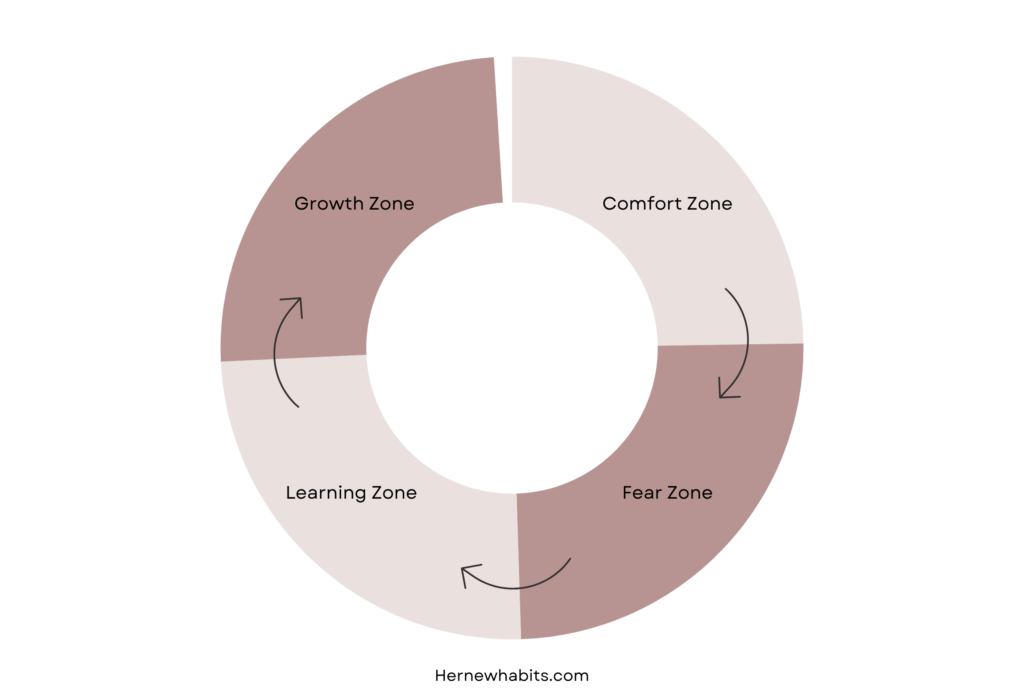Being introverted is a wonderful thing. You cherish your alone time, find peace in quiet spaces, and thrive on deep conversations. But sometimes, that cozy comfort zone can start to feel a little…well, cozy. Maybe you’re ready to stretch your wings a bit, try new things, and meet some interesting people.

The good news? You don’t have to morph into a social butterfly overnight. There are tons of small, introverted-friendly ways to step outside your comfort zone and experience some personal growth.
In this post, we’ll explore eleven easy strategies that will help you break free from the routine and embrace new adventures, all while staying true to your introverted nature.
What is the “comfort zone”?
In psychology, the concept of a comfort zone is interesting. It’s not just about fluffy feelings and relaxation (although that can be part of it!). It’s more about your mental state1 when you’re doing something.

Think of it this way: When you’re in your comfort zone, you feel in control and confident. You know what to expect, and things generally go smoothly. There’s a low level of anxiety and stress because you’re familiar with the situation. It’s like wearing your favorite pair of jeans – they’re comfy and reliable, and you know they’ll fit just right.
The key thing to remember is that your comfort zone is built by your own experiences and thoughts. If you believe a situation might be difficult or overwhelming, you’re less likely to step outside your comfort zone2 and try it. But, as we’ll explore later, that doesn’t mean you’re stuck there forever!
The four zones of self-improvement:
As introverts, we all have our comfort zones – those familiar routines and social settings where we feel safe and in control. But true growth often happens outside those cozy boundaries. This is where the concept of zones comes in. It helps us understand the emotional journey of pushing ourselves and ultimately achieving personal development.

Here’s a breakdown of the 4 zones you’ll encounter:
- Comfort Zone: This is your happy place. You know the ropes, feel relaxed, and things run smoothly. It’s where you recharge your social battery.
- Fear Zone: Stepping outside your comfort zone can trigger feelings of anxiety, self-doubt, and apprehension. This is the fear zone. It’s completely normal to feel this way, but it’s important not to let it paralyze you.
- Learning Zone: When you push through the fear, you enter the learning zone. Here, you’re actively acquiring new skills, overcoming challenges, and expanding your horizons. This is where the magic happens – you’re actively developing yourself!
- Growth Zone: The learning zone eventually leads to the growth zone. This is where you’ve not only embraced new experiences but also thrived in them. You’ll feel a sense of accomplishment, increased confidence, and a willingness to tackle even bigger challenges.
Remember, introverts can thrive outside their comfort zones. By understanding these zones, you can navigate the process of personal development with more ease and celebrate the victories along the way.
Benefits of leaving your comfort zone:

Engaging in unfamiliar activities has a positive effect on introverts’ lives in a few key ways:
- Self-discovery: Stepping outside your comfort zone can be a journey of self-discovery3. You might surprise yourself with hidden talents or newfound passions. You may learn you’re braver than you thought, or that you enjoy social situations in smaller doses.
- Breaking old habits: It’s easy to get stuck in a rut, especially as an introvert who cherishes alone time. By trying new things, you can challenge yourself to re-evaluate your routines and discover new ways to recharge and thrive.
- Boosting flexibility and adaptability4: The unexpected is inevitable. Life throws curveballs, and sometimes they come at you fast. By venturing outside your comfort zone, you develop the resilience and skills to adapt to new situations and become more flexible. This can be helpful in your career, relationships, and overall sense of well-being.
11 simple ways to get out of your comfort zone as an introvert:
Number 1: Make learning a priority:

Ever heard the saying, “You learn something new every day”? Well, introverts can harness the power of learning to step outside their comfort zone. Here’s the trick: adopt a growth mindset5.
Imagine two people:
- Fixed mindset: This person believes they’re born with a set amount of talent and can’t improve. Trying something new feels pointless because they might not be good at it.
- Growth mindset: This person sees learning as a journey. They’re always up for trying new things, even if it means making mistakes. They know that with effort, they can develop new skills.
By embracing a growth mindset, you become okay with being a beginner. You see challenges as opportunities to learn, not reasons to shy away. Here’s how to put this into action:
- Sign up for a class on something that’s always piqued your interest, like photography or pottery.
- Dust off that hobby you tried once and decided wasn’t for you. Maybe with a fresh perspective, you’ll enjoy it!
- Challenge your self-talk. Instead of saying “I can’t do this,” reframe it as “This will be challenging, but I’m determined to learn.”
Number 2: Embrace the imperfect journey:
Let’s be honest, aiming for flawless execution right out of the gate can be paralyzing for anyone, introverts included. Here’s the good news: stepping outside your comfort zone is about progress, not perfection.
By lowering your expectations a bit, you create space for effort and growth. Those moments that might have felt like setbacks before can be reframed as learning opportunities.
Instead of viewing them as setbacks or failures, see them as opportunities to learn and grow. This shift in perspective, adopted by soccer referees in a 2007 study6, allows them to analyze their errors without dwelling on them. Instead of feeling shame or fearing repetition, they focus on moving forward and improving.
This same approach can help you conquer new experiences as an introvert. Take a deep breath, embrace the challenge, and remember, growth isn’t about getting everything right the first time, it’s about getting better over time.
Number 3: Find ways to help others:

A study demonstrated that helping others7 is a great way to get out of your comfort zone and increase your life satisfaction. Introverts often have much to offer, and volunteering your time or skills can be a win-win. You’ll be stepping outside your comfort zone by interacting with new people and putting yourself out there, but the good feeling you get from helping others will recharge your introvert batteries.
Here are some introvert-friendly ways to help:
- Animal shelters: Many shelters need help walking dogs, socializing cats, or cleaning up. It’s a chance to give back to furry friends on your terms, with minimal social interaction required.
- Online volunteering: Websites like VOLUNTEERMATCH: https://www.volunteermatch.org/ connect volunteers with remote opportunities. You can use your writing skills to create content for a non-profit or offer tech support from the comfort of your home.
- Community gardens: Pitching in at a community garden allows you to help beautify your area while getting some fresh air and exercise. Plus, you can socialize as much or as little as you feel comfortable.
Number 4: Focus on the Positive Recharge:
Being an introvert can mean you experience the world a little differently. Sometimes, those exciting moments others crave leave you feeling a bit neutral. It’s not that you don’t enjoy them, but your brain might not register those positive feelings quite as strongly8.
Here’s the good news: that doesn’t mean you can’t enjoy new experiences! Instead of chasing a big emotional rush, focus on the idea of a positive recharge. Trying a new activity, even if it’s just a small step outside your comfort zone, can energize you differently.
Think of it like this: your happy place is like a cozy reading nook, perfect for relaxing. But venturing out can be like exploring a new trail. It might take some effort, but the fresh air and beautiful scenery can leave you feeling refreshed and invigorated in a whole new way. The key here is to train your brain to recognize and appreciate these positive moments.
Here’s how:
- Pay attention: Next time you’re laughing at a show or find yourself captivated by a sunset, take a mental snapshot. Notice the physical sensations – a smile spreading across your face, a feeling of relaxation in your shoulders.
- Savor it: Don’t rush past these good feelings. Let them linger for a moment.
Number 5: Share insights of what you read:
Let’s face it, introverts are champion information gatherers. We love getting lost in a good book, devouring blog posts, or diving deep into news articles. But all that knowledge can stay trapped inside our heads if we don’t share it!
Iain Atherton and Richard Kyle9, in their work on developing personal skills in nurses, emphasize the importance of stepping outside your own experience. Here’s how this applies to you:

- Pick a topic you find fascinating: Whether it’s the latest psychology research or that mind-blowing historical tidbit you just unearthed, choose something that sparks your curiosity.
- Share your insights: Talk to a friend, family member, or even join an online forum related to the topic. Explain what you learned and see if it resonates with them.
- Ask their thoughts: This isn’t just about you being a human encyclopedia (although, hey, knowledge is power!). By asking their opinion, you gain a fresh perspective and broaden your understanding.
This simple act of sharing goes a long way. You’ll not only solidify your knowledge but also develop empathy and build stronger connections with others – all while staying comfortably within your realm of expertise.
Number six: Boost your self-confidence:
Stepping outside your comfort zone involves a healthy dose of “let’s do this!” That’s where self-confidence swoops in to save the day. New experiences often come with a side of uncertainty, but believing in your abilities makes it way easier to embrace the unknown.
The more you trust your skills10, the more likely you are to jump into a challenging situation (even if it involves a little small talk).

So, how do you build that inner confidence? Here are a few ideas:
- Celebrate your wins (big or small)! Did you finally master that tricky baking recipe? Did you speak up in a meeting and share a brilliant idea? Acknowledge your accomplishments, no matter how seemingly minor.
- Focus on your strengths. We all have unique talents. Spend some time reflecting on what you’re good at and how you can leverage those strengths in new situations.
- Fake it ’til you make it. Sometimes, even if you don’t feel confident, acting confident can do wonders. Stand tall, make eye contact, and smile. You might be surprised at how quickly you start to feel more self-assured.
Number 7: Change your daily routine:
Who says routine has to be boring? Introverts thrive on predictability, but that doesn’t mean your day-to-day can’t have a little shakeup. Here’s how to break the mold without feeling overwhelmed11:
- Tiny Tweaks: We’re not talking about a complete overhaul here. Take a look at your routine and see where you can introduce simple changes. Brushing your teeth with your other hand (yes, really!) or taking a different route to work are easy ways to jolt your brain out of autopilot mode.
- Explore Your Neighborhood: Instead of your usual coffee shop haunt, try a new one down the street. Take a different path on your evening walk and discover hidden gems in your neighborhood.
- Theme Nights: Liven up your week with themed nights! Dedicate a Tuesday to trying a new recipe from a different cuisine, or have a movie night focused on a specific genre you haven’t explored before.

Remember, even small changes can make a big difference. By introducing a bit of variety into your routine, you’ll be surprised at how much more engaged you feel with the world around you.
Number 8: Try activities outdoors:
Participate in outdoor sports or activities to expand your comfort zone12. You can sign up for a camping trip, join a local hiking group, or even just start taking walks in a new park. Being in nature has a well-documented calming effect, which can be especially helpful for introverts who might feel overwhelmed in social situations. Plus, getting some exercise is a win-win – it boosts your mood and energy levels, making it easier to face new experiences.
Here are some introvert-friendly outdoor activities to consider:
- Solo adventures: Hiking, biking, kayaking, or gardening are all fantastic ways to connect with nature and recharge your batteries at your own pace.
- Small group activities: Look for local clubs or groups focused on birdwatching, stargazing, or photography. These offer a chance to socialize with like-minded people while still enjoying the peacefulness of the outdoors.
- Volunteer opportunities: Many organizations need help with park clean-up days, tree-planting initiatives, or nature walks for children. This is a great way to give back to the community and meet new people who share your love of nature, all in a low-pressure setting.

Even small changes can make a big difference. Start by incorporating short walks into your routine or exploring a nearby park you haven’t visited before. You might be surprised at how much you enjoy stepping outside your comfort zone and into the fresh air.
Number 9: Reorganize your environment:
We all crave a cozy haven, but sometimes that haven can become a rut. A familiar environment can subconsciously steer you towards your usual comfort activities13. While moving to a new city might not be in the cards (trust me, introverts get it!), there are ways to shake things up at home.
Here’s how to materialize this strategy:
- Swap furniture: Shift your couch, rearrange your bookshelf, or even just move a lamp. A new layout can spark fresh ideas and encourage you to use different parts of your space.
- Themed corners: Dedicate a specific area for a new hobby, like a reading nook or a writing corner. This can visually signal a shift in focus and motivate you to dive into a new activity.
- Seasonal refresh: Update your décor with seasonal touches. Spring flowers or cozy throws can subtly change the vibe and inspire you to try new things within your familiar space.
Now, we’re not suggesting a full-blown home renovation (though, go for it if that’s your jam!). Even small changes can make a big difference.
Number 10: Challenge yourself at work:

Stepping out of your comfort zone can happen even at your day job! Introverts often thrive in familiar routines, but a little shake-up can be a good thing.
These could be things like volunteering for a new presentation or taking the lead on a small project.
Feeling brave? Talk to your boss about your desire to step outside your comfort zone. They might be surprised and impressed by your initiative, and they can offer guidance and support.
Here are some specific examples (inspired by Harvey & De Meuse, 20214) to get you started:
- Volunteer for a new task: Is there a project coming up that uses a skill you’d like to develop? Let your boss know you’re interested in being involved.
- Join a cross-functional team: Working with colleagues from different departments can expose you to new ideas and perspectives.
- Lead a brainstorming session: This can be a great way to contribute your ideas in a controlled setting.
Don’t be afraid to start with something seemingly insignificant, like a new task. Over time, you’ll be surprised at how much you can grow!
Bonus tip: Introverts often recharge by spending time alone. Be sure to schedule some quiet time after work to relax and reflect on your experiences.
Number 11: Read opinions different from what you think:
We introverts tend to gravitate towards familiar spaces and people who share our perspectives. While this is comfy (and there’s nothing wrong with that!), it can limit our growth.
Here’s a tip: actively seek out different viewpoints14.
Step outside your echo chamber. Explore books, articles, or social media accounts that present contrasting viewpoints on various topics. Don’t just skim for things you agree with – challenge yourself to understand the “why” behind opposing opinions. You might be surprised by what you learn, and even if you don’t change your mind entirely, you’ll gain a broader perspective.
Remember, growth often happens outside our comfort zone. When we encounter new ideas, we can refine our own beliefs and become more well-rounded individuals.
Exposure to diverse opinions isn’t about changing your mind completely. It’s about enriching your understanding of the world and fostering intellectual curiosity. You might be surprised by how much you learn, even if you don’t agree with everything you read.
Why getting out of your comfort zone is hard?

Let’s face it, stepping outside your comfort zone can feel…icky. Introverts, we all know the drill. According to Andy Molinsky15, there are five big reasons why “reaching” out of our comfort zone (as he puts it) can be such a challenge:
- Fear of inauthenticity: You might worry that trying new things makes you seem like someone you’re not.
- Social anxiety: The thought of others judging you can be a real downer.
- Imposter syndrome: That voice in your head whispering, “You can’t do this!” Yeah, that one.
- Embarrassment: The possibility of stumbling or looking silly can be enough to hold you back.
- Feeling out of place: Trying new things can sometimes feel like you’re crashing someone else’s party.
These are all normal feelings! But remember that staying in your comfort zone avoids these feelings in the short term, but it also limits your growth and experiences in the long run.
When do you need to get out of your comfort zone?
Listen, introverts – there’s no shame in loving your alone time. It’s what fuels us! But sometimes, that cozy corner of our comfort zone can feel a bit like a cage. Maybe that dream job requires a presentation, or that amazing travel opportunity involves meeting new people. Whatever the reason, there are times when stepping outside your comfort zone is the key to unlocking personal growth.
So, how do you know when it’s time to make a move? Here’s the good news: you get to decide! If your comfort zone is holding you back2 from reaching your goals, achieving that promotion, or simply trying something new, then it might be time for a little adventure.
Why “Get out of your comfort zone” could be bad advice?

We’ve all heard the saying “Get out of your comfort zone” to push ourselves and grow. But for introverts, this advice can sometimes backfire. Here’s why:
- Jumping in too deep: Imagine being thrown into a mosh pit at a concert – overwhelming, right? That’s how some “get out of your comfort zone” activities can feel for introverts. Choosing activities that are way too risky or stressful can leave you drained and discouraged.
- Short-lived change: Sure, forcing yourself to do something scary might get you through the event, but it probably won’t create a lasting change16. Introverts recharge by spending time alone, so constantly pushing yourself past your limits can be unsustainable.
The key is to find ways to stretch yourself that feel manageable and play to your strengths. That way, you’re more likely to see long-term progress and avoid introverted burnout.
Conclusion
Stepping outside your comfort zone can feel daunting, but as an introvert, you don’t have to become an extrovert overnight. Even small challenges can lead to big growth. Remember, it’s okay to take things at your own pace.
Celebrate your victories, big or small, and enjoy the sense of accomplishment that comes with trying new things. You might be surprised by what you discover about yourself and the world around you.
References:
- Kiknadze, Nona (2018). Comfort Zone Orientation: Moving Beyond One’s Comfort Zone. Honors thesis, Duke University. Retrieved from https://hdl.handle.net/10161/16710.
- Dryden, W. (2012). How to Come Out of Your Comfort Zone. John Murray Press. https://books.google.com/books?id=AwONDwAAQBAJ
- Laura Prazeres (2017) Challenging the comfort zone: self-discovery, everyday practices and international student mobility to the Global South, Mobilities, 12:6, 908-923, DOI: 10.1080/17450101.2016.1225863
- Harvey, V. S., & De Meuse, K. P. (Eds.). (2021). The Age of Agility: Building Learning Agile Leaders and Organizations. Oxford University Press. https://books.google.com/books?id=la8gEAAAQBAJ
- Dweck, C. S. (2006). Mindset: The New Psychology of Success. Random House Publishing Group. https://books.google.com/books?id=fdjqz0TPL2wC
- Wolfson, Sandy and Neave, Nick (2007) Coping under pressure: cognitive strategies for maintaining confidence among soccer referees. Journal of Sport Behavior, 30 (2). pp. 232-247. ISSN 0162-7341 Published by: University of South Alabama URL: This version was downloaded from Northumbria Research Link: https://nrl.northumbria.ac.uk/id/eprint/3301
- Pninit Russo-Netzer & Geoffrey L. Cohen (2023) ‘If you’re uncomfortable, go outside your comfort zone’: A novel behavioral ‘stretch’ intervention supports the well-being of unhappy people, The Journal of Positive Psychology, 18:3, 394-410, DOI: 10.1080/17439760.2022.2036794
- Fleeson W, Malanos AB, Achille NM. An intraindividual process approach to the relationship between extraversion and positive affect: is acting extraverted as “good” as being extraverted? J Pers Soc Psychol. 2002 Dec;83(6):1409-22. PMID: 12500821.
- Atherton, Iain & Kyle, Richard. (2015). Stepping outside your comfort zone. Nursing standard (Royal College of Nursing (Great Britain) : 1987). 29. 24-5. 10.7748/ns.29.21.24.s28.
- Kiknadze, Nona (2018). Comfort Zone Orientation: Moving Beyond One’s Comfort Zone. Honors thesis, Duke University. Retrieved from https://hdl.handle.net/10161/16710.
- Page, O. (November 4, 2020). How to leave your comfort zone and enter your ‘growth zone.’ Positive Psychology. https://positivepsychology.com/comfort-zone/
- Brookes, A. (2003, April). Keynote no. 3 Character building. Why it doesn’t happen, why it can’t be made to happen, and why the myth of character building is hurting the field of outdoor education. In 13th National Outdoor Education Conference Proceedings Adelaide South Australia (p. 19).
- S.L. Mathiesen, D. Moula-Stahli, D.V. Byrne, Q.J. Wang, (2022) Leaving your comfort zone for healthier eating? Situational factors influence the desire to eat comfort food and simulated energy intake, Food Quality and Preference, Volume 100, https://doi.org/10.1016/j.foodqual.2022.104605.
- Schneegans, T. (2019). Escaping the comfort zone: A three-level perspective on filtering effects and counter-measures.
- Molinsky, A. (2017). Reach: A New Strategy to Help You Step Outside Your Comfort Zone, Rise to the Challenge and Build Confidence. Penguin LLC US. https://books.google.com/books?id=F7PEDAAAQBAJ
- Berman, Dene & Davis-Berman, Jennifer. (2005). Positive Psychology and Outdoor Education. Journal of Experiential Education. 28. 17-24. 10.1177/105382590502800104.




Leave a Reply